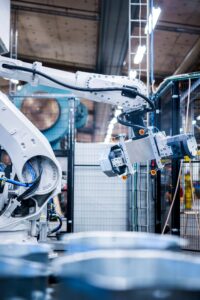When you drive down Industrial Parkway, it’s easy to miss the modest building that houses Wilson Precision Manufacturing. Yet behind those walls, three generations of the Wilson family have built components that are found in everything from commercial aircraft to medical devices. I recently sat down with Robert Wilson, current CEO and grandson of founder Harold Wilson, to discuss the company’s 68-year journey and how they’ve managed to thrive while many American manufacturers have disappeared.
From Garage to Global: The Birth of a Manufacturing Legacy
Jason: Your family business is now in its third generation. Can you take us back to the beginning and share what motivated your grandfather to start this manufacturing business?
Robert: It’s quite a story, actually. My grandfather Harold was a machinist at the old Peterson Steel plant during World War II. When the war ended and production scaled back, he was one of hundreds laid off. He had five kids to feed – my dad was the youngest – and instead of looking for another factory job, he decided to bet on himself.
He’d saved enough to buy a used lathe and set it up in his garage. He started making replacement parts for local farm equipment, which was in high demand since many farms had been running their machinery hard during the war years without being able to get new equipment.
Jason: What was the economic and industry landscape like when the company was founded? What need was he filling?
Robert: Post-war America was booming in many ways, but there were also significant shortages. New tractors and farm implements had waiting lists of 6-12 months. Harold realized farmers couldn’t afford to have equipment down that long, so he focused on making replacement parts faster than the big manufacturers could.
He had this philosophy that being small meant being nimble. He could machine a custom part in days when the big companies would take weeks just to process the order. That’s still part of our DNA today.
Jason: Were there any pivotal early decisions that set the foundation for the company’s longevity?
Robert: The biggest one was probably in 1961 when my grandfather invested in one of the first numerically controlled milling machines in the region. It nearly bankrupted the company – he mortgaged everything to buy it. People thought he was crazy to spend that kind of money when hand machining had worked fine.
But that decision put us years ahead of competitors. We could suddenly produce precision parts with consistency that was impossible by hand. It led to our first aerospace contracts, which became the backbone of the business for decades.
My grandfather wasn’t formally educated, but he understood that technology would change manufacturing, and he wanted to be ahead of that curve, not behind it.
From Father to Son to Grandson: The Generational Transitions
Jason: What was the transition like between the first and second generations? And then between the second and your generation?
Robert: [laughs] Neither one was particularly smooth, to be honest. My grandfather didn’t want to retire. He worked until he was 78, and even then, he came to the shop almost every day. He and my father butted heads constantly because my dad wanted to modernize operations and expand into new markets, while my grandfather was more cautious.
When my father took over in 1985, he immediately invested in CNC technology and computer systems for the office. He also pushed us into the medical device industry, which turned out to be brilliant timing as that sector exploded in the ’90s.
My transition was different. I actually left the family business after college and worked for General Electric for seven years. I wanted to learn how the big companies operated. When I came back in 2010, my father was more ready to step back than my grandfather had been. He stayed on as Chairman but gave me operational control much earlier.
Jason: How has the core business evolved from the first generation to now? What has remained consistent?
Robert: The core of making precision metal components has remained, but almost everything else has changed. My grandfather primarily made agricultural and industrial parts. My father shifted focus to aerospace and medical. Under my leadership, we’ve added a significant amount of defense work and specialized in titanium components, which are much more challenging to machine but command higher margins.
What’s stayed consistent is our commitment to quality and precision. My grandfather used to say, “If it has the Wilson name on it, it’s right to the thousandth of an inch.” Today, we’re working to the millionth of an inch on some aerospace components, but that mindset hasn’t changed.
Jason: What values or principles established by the founder are still guiding the business today?
Robert: Three big ones. First, invest in your people – we have machinists who’ve been with us for 30+ years because my grandfather and father prioritized treating employees like family. Second, reinvest in technology – we put about 15% of profits back into new equipment every year, without fail. And third, always answer the phone when a customer calls with a problem – that’s literally a rule in our company handbook.
Weathering Economic Storms as a Family Business
Jason: What do you think would surprise your grandfather most about how the business operates today?
Robert: [smiles] The robots, definitely. We have six automated cells now where parts move from machine to machine with robotic arms. He wouldn’t recognize the shop floor.
But I think he’d also be shocked at the paperwork and regulation. When he started, a handshake was a contract. Now we have a full-time compliance officer just to keep up with regulations from a dozen different agencies.
Jason: How has being a family-owned business specifically helped you weather economic challenges?
Robert: We can make decisions quickly without answering to shareholders or a board. During the 2008 recession, we cut everyone’s hours to 32 per week, including management, rather than laying people off. A public company would never have done that – they’d have cut 20% of the workforce to maintain their stock price.
We also don’t have debt. That’s a non-negotiable principle from my grandfather that both my father and I have maintained. It means we grow slower during good times, but we sleep better during downturns.
Jason: Can you share a story about an early challenge the business faced and how overcoming it shaped your company’s identity?
Robert: In 1973, during the oil crisis, our material costs tripled overnight, and many customers couldn’t afford to place new orders. It nearly broke us. My grandfather gathered everyone together – there were only about 15 employees then – and laid out the situation. Instead of layoffs, everyone agreed to work three days a week until things improved.
To fill the gap, my grandfather started bidding on specialty prototype work that other shops wouldn’t touch because the quantities were too small to be profitable. It turned out those prototypes led to relationships with R&D departments at major companies, which eventually became some of our best long-term customers.
That crisis taught us to diversify and to look for opportunity in specialized work that others avoid. It’s why today about 30% of our business is in low-volume, high-complexity parts that most manufacturers won’t touch.
Looking to the Future
Jason: Looking ahead, what are your thoughts about the fourth generation and the future of family ownership?
Robert: That’s the million-dollar question. I have two children – my daughter is in engineering school and has worked summers here. She seems interested in the business. My son is more focused on the business side and is getting his MBA. I’m not pressuring either of them.
I’ve seen too many family businesses fail because children felt forced into roles they didn’t want. If they choose other paths, we might look at employee ownership or other succession options.
What I do know is that American manufacturing has a future, despite what you might read. It will be more automated, more specialized, and require different skills, but there will always be a need for companies that can make complex parts with absolute precision and reliability. That’s what three generations of Wilsons have built, and I feel good about where we stand for the future.
Wilson Precision Manufacturing employs 87 people and operates from a 65,000 square foot facility. Their components can be found in commercial aircraft, medical imaging equipment, surgical instruments, and defense systems. Learn more at www.wilsonprecision.com.
Join the Conversation
Do you have experience with family business transitions? What questions would you have for Robert about manufacturing in America today? Share your thoughts in the comments below.





